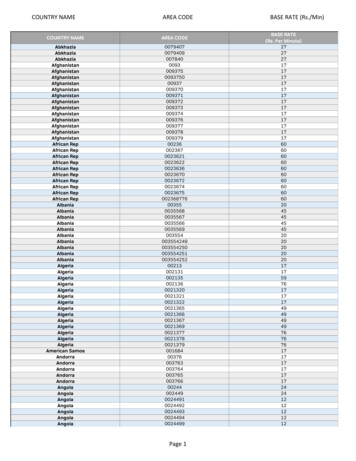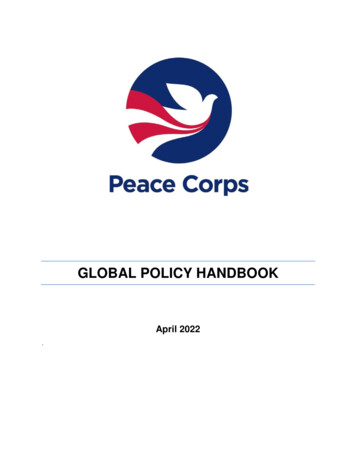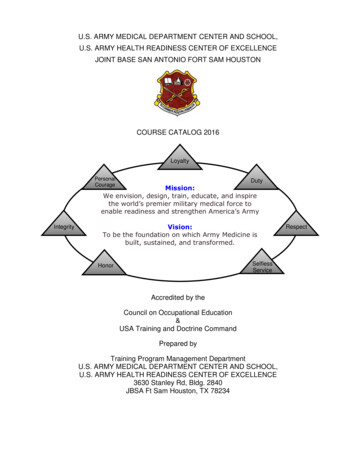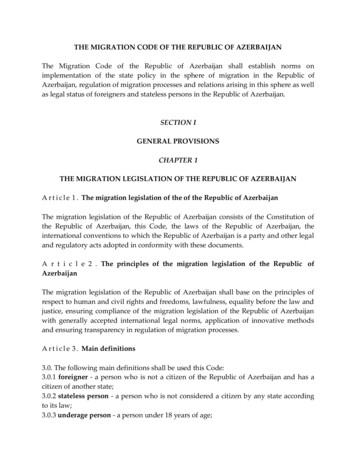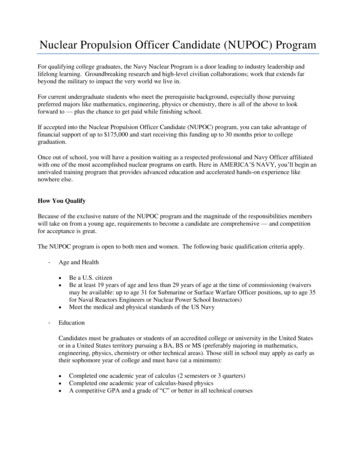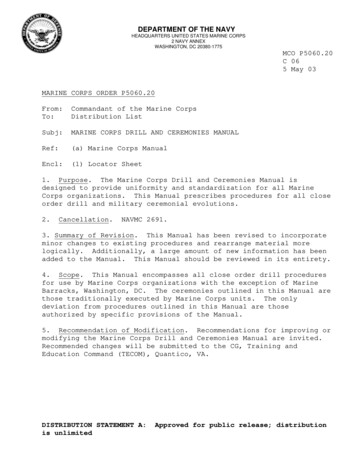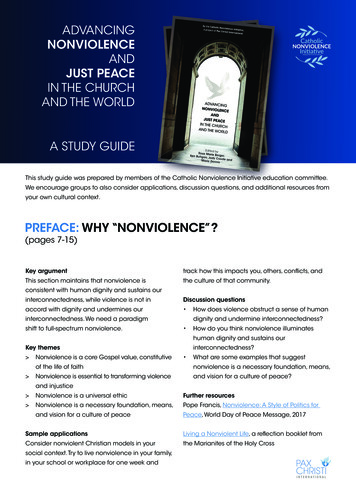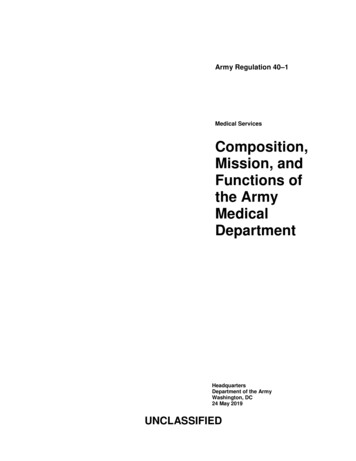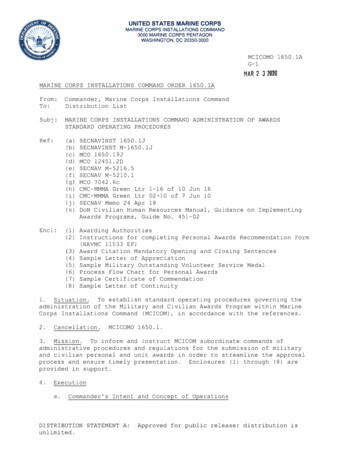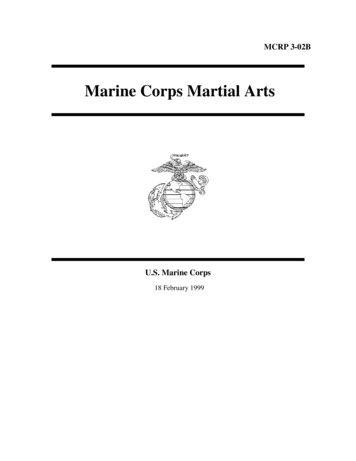
Transcription
AZERBAIJAN LANGUAGEMANUALPEACE CORPS/AZERBAIJAN
The text accompanies the following twenty-three (23) audio tracks: AZ Azerbaijani Lesson 0.mp3AZ Azerbaijani Lesson 1.mp3AZ Azerbaijani Lesson 2.mp3AZ Azerbaijani Lesson 3.mp3AZ Azerbaijani Lesson 4.mp3AZ Azerbaijani Lesson 5.mp3AZ Azerbaijani Lesson 6.mp3AZ Azerbaijani Lesson 7.mp3AZ Azerbaijani Lesson 8.mp3AZ Azerbaijani Lesson 9.mp3AZ Azerbaijani Lesson 10.mp3AZ Azerbaijani Lesson 11.mp3AZ Azerbaijani Lesson 12.mp3AZ Azerbaijani Lesson 13.mp3AZ Azerbaijani Lesson 14.mp3AZ Azerbaijani Lesson 15.mp3AZ Azerbaijani Lesson 16.mp3AZ Azerbaijani Lesson 17.mp3AZ Azerbaijani Lesson 18.mp3AZ Azerbaijani Lesson 19.mp3AZ Azerbaijani Lesson 20.mp3AZ Azerbaijani Lesson 21.mp3AZ Azerbaijani Lesson 22.mp3AZ Azerbaijani Lesson 23.mp3(Time: 2:22) (File Size: 2.16 MB)(Time: 4:13) (File Size: 3.86 MB)(Time: 4:08) (File Size: 3.78 MB)(Time: 3:01) (File Size: 2.77 MB)(Time: 5:04) (File Size: 4.64 MB)(Time: 0:38) (File Size: 600 KB)(Time: 1:20) (File Size: 1.22 MB)(Time: 4:36) (File Size: 4.21 MB)(Time: 3:48) (File Size: 3.48 MB)(Time: 2:51) (File Size: 2.61 MB)(Time: 2:14) (File Size: 2.05 MB)(Time: 3:12) (File Size: 2.93 MB)(Time: 1:34) (File Size: 1.44 MB)(Time: 4:33) (File Size: 4.17 MB)(Time: 6:58) (File Size: 6.38 MB)(Time: 1:40) (File Size: 1.52 MB)(Time: 0:57) (File Size: 897 KB)(Time: 2:05) (File Size: 1.91 MB)(Time: 1:43) (File Size: 1.57 MB)(Time: 2:20) (File Size: 2.14 MB)(Time: 2:45) (File Size: 2.52 MB)(Time: 5:25) (File Size: 4.97 MB)(Time: 2:14) (File Size: 2.04 MB)(Time: 5:13) (File Size: 4.77 MB)TABLE OF CONTENTSBRIEF INTRODUCTION TO THE AZERBAIJANI LANGUAGE .4LESSON 1 .5AZERBAIJANI ALPHABET .5VOWEL HARMONY .5LESSON 2 .6PERSONAL PRONOUNS .6TO BE SUFFIXES IN THE PRESENT TENSE.6LESSON 3 NEGATIVE AND AFFIRMATIVE FORMS OF ‘TO BE’ IN PRESENT.7LESSON 4 .7HOW TOGREET AND RESPOND TO GREETING .7LESSON 5 .8OTHER EXPRESSIONS USED FOR GREETING .8LESSON 6 .8SAYING GOOD- BYE .8LESSON 7 .8POSSESSIVE PRONOUNS/POSSESSIVENESS .8POSSESSIVE SUFFIXES .9Intro to the Azerbaijan Language, Peace Corps/Azerbaijan2
LESSON 8 .10GETTING AQUAINTED .10LESSON 9 .10INTRODUCTIONS .10LESSON 10 .11POLITELY SPEAKING .11LESSON 11 .11FREQUENTLY USED VERBS- COMMANDS .11LESSON 12 FORMAL AND INFORMAL COMMAND FORMS .12LESSON 13 .12PRESENT TENSE .12LESSON 14 .13EXPRESSING NEEDS AND ASKING ABOUT PRICE .13LESSON 15 .14ASKING QUESTIONS .14LESSON 16 .14THE ADJECTIVES .14LESSON 17 .14AGREEING AND DISAGREEING .14LESSON 18 .15ASKING/REQUESTING FOR SOMETHING OR OFFERING ASSISTANCE .15LESSON 19 .15TALKING ABOUT LANGUAGE ABILITIES .15LESSON 20 .15ASKING FOR DIRECTIONS .15LESSON 21 .16CONVERSATION WITH THE HOST FAMILY.16LESSON 22 .17EXPRESSING LIKES AND DISLIKES .17LESSON 23 .17NUMERALS .17Intro to the Azerbaijan Language, Peace Corps/Azerbaijan3
Brief Introduction to the Azerbaijani LanguageThe Azerbaijani language is the official language of the Azerbaijan Republic. Azerbaijani isspoken by about 8 million people in Azerbaijan Republic and generally by 50 million peopleall over the world. Azerbaijani is a member of the Turkic branch of the Altaic language family,which includes about 20 languages. Close to 150 million people speak these languages inthe area that stretches from the Adriatic Sea in the west to Mongolia, Siberia and China inthe east. Specifically, Azerbaijani belongs to the Oghuz Seljuk sub-group, along with(Osmanli) Turkish. Other well-known members of the Turkic branch include: Uzbek, Kipchak,Kyrgyz, Tatar, and Kazakh. The Turkic languages closely resemble each other and form acomplex of mutually intelligible dialects.Characteristic features of the Azerbaijani language are: Like all of the Turkic languages, Azerbaijani is agglutinative, that is, grammaticalfunctions are indicated by adding various suffixes to fixed stems. Separate suffixes on nouns indicate both gender and number, but there is nogrammatical gender. Absence of initial and final consonant clusters (with some exceptions for the finalconsonant clusters) Absence of articles Instead of prepositions, it uses postpositions . For example: Anam ilə with mymother Nouns are inflected for case. There are five case endings. It is subject-object-verb language It has a vowel harmonyThe Azerbaijani language has 32 letters. Stress always falls on the last syllable.Intro to the Azerbaijan Language, Peace Corps/Azerbaijan4
Lesson 1Azerbaijani е)(yе)(zе)Nümunələr(Examples)Ata, imla (father, dictation)Böyük, məktəb (big, school)Cavab, аğаc (answer, tree)Çаy, çiçək (tea, flower)Dağ, qənd (mountain, sugar)Elm, neft (science, oil)əт, dərs (meat, lesson)fəhlə, şarfgəmi, gün (close to English “g” in“give, singer”)Oğlan, bağ (boy, garden) ( close toFrench “r”in “pardon”)həftə, hava (week, air)xəritə, yaxşı (close to Scottish“ch”in “loch”)Bıçaq, balıq (knife, fish)(close toEnglish “y”in ”symbol”)Indi, inək (now, cow)Jurnal, qaraj (magazine, garage)Kartof, fizika (potato, physics)Qapı, qaşıq (door, spoon)Lampa, palto (lamp, coat)Mavi, pambıq (blue, cotton)Ana, nahar (mother, dinner)otaq, orta (room, middle)çörək, ördək (bread, duck)pəncərə, pendir (window, cheese)Radio, armud (radio, pear)Süd, su (milk, water)Şorba, şam (soup, candle)Tarix, mətn (history, text)Uşaq, qum (child, sand)Üzüm, üz (grape, face)(very closeto German - übung)Valideyn, divar (parents, wall)Yay, yeni (summer, new)Mağaza, zavod (shop, plant)As in the wordFatherBigJamCheckDayEnd, elephantMan, badFactory, scarfHand, hereHobbyBeach, leaveGarage, massageCat ,class, cabbageGo, getLamp, lemonMap, machineNine, nextBoss, oftenBurn, earnPen, pencilRedCity, sideShy, shineText, timeMoon, soupVital, vastYes, yesterdayZebra, zeroVowel HarmonyIn Azerbaijani there is a phenomenon called vowel harmony in which the vowels of suffixes mustharmonize with the vowels of noun and verb stems, for example, if the stem has a hard vowel (a,ı, o, u), then the vowel of the suffix must be hard; if the stem has a soft vowel (e, ə, i, ö, ü), thenthe suffix must be soft. For example:kitab lar (lar- plural suffix)kitab ın (Genetive case)zavod un (Genetive case)gül lər (plural)məktəb ə (dative case)booksbook’splant’sflowersto schoolNote: Though this concept may be difficult to understand at first, Peace Corps Language trainerswill work with you during Pre-Service Training to help you understand.Intro to the Azerbaijan Language, Peace Corps/Azerbaijan5
Lesson 2Personal “To be” suffixes in the Present TenseTo convey the same meaning of the English “to be” Azerbaijani has different words and suffixes.The most common of them are the personal suffixes that attach to nouns, adjectives, andlocations and express the meaning of “to be noun/adjective/adverb”.For example: Bu kitabdır It is a book.O, qız qəşəngdir That girl is beautiful.Kitab rəf də dir The book is on the shelf (note that ” də” here indicates location.).Negative is formed by the word “deyil”.For example: Bu kitab deyil This is not a book. Kitab rəfdə deyil The book is not on the shelf. O qız qəşəng deyil That girl is not beautiful.See below for endings used with different persons:PersonalPronoun1st person2nd person3rd personSingularPluralMən – (y)am, - (y)əmMən həkim əm (I am adoctor)Mən ağıllı y am ( I amclever)Sən -- san, sənSən həkim sən (You are adoctor)Sən ağıllı san (You areclever)Biz – (y)ıq, (y)ik, (y)uq, (y)ükBiz həkim ik (We are doctors)Biz ağıllı y ıq (We are clever)O – dır, dir, dur, dürO həkim dir (He/she is adoctor)O ağıllı dır (He/she isclever)Sınız4 or (shorter form)– sız, siz, suz,süzSiz həkim siniz(siz) (You aredoctors)Siz ağıllı sınız(sız) (You are clever)Onlar – dır, dir, dur, dürOnlar həkim dir(lər). (They aredoctors)Onlar ağıllı dır (lar) (They are clever)Note that ‘y’ is a connecting consonant, which is used between two vowels. For example: Məngüclü y əm I am strong.Intro to the Azerbaijan Language, Peace Corps/Azerbaijan6
Lesson 3Negative and Affirmative Forms of ‘to be’ in PresentI am a teacher -- I am not a teacher.You are a doctor – You are not a doctor.He/she is a driver -- He/she is not a driver.We are Volunteers -- We are not Volunteers.You are Trainees – You are not Trainees.They are workers -- They are not workers.Mən müəlliməm – Mən müəllim deyil əm.Sən həkimsən – Sən həkim deyil sən.O sürücüdür- O sürücü deyil.Biz könüllüyük – Biz könüllü deyil ik.Siz təlimçisiniz (siz) – Siz təlimçideyil siniz.Onlar fəhlədir(lər) – Onlar fəhlədeyil (lər).Lesson 4How to greet and respond to a greetingEnglishAzerbaijaniDialogue-1A: - Hello!B: - HelloA: - How are you?B: - I am fine, thank you very much. How areyou?A: - I am fine too. Thank you.Dialoq-1A: - Salam!B: - Salam!A: - Necəsiniz? (formal)B: - Yaxşıyam, çox sağ olun. Siznecəsiniz?A: - Mən də yaxşıyam. Sağ olun.Dialogue- 2A: - Hi! How are you?B: - I am fine, thank you. How are you?A: - I am fine too. How are things?B: - Not bad. How is everything with you?A: - Fine.Dialoq- 2A: - Salam! Necəsən? (informal)B: - Yaxşıyam, sağ ol. Sən necəsən?A: - Mən də yaxşıyam. İşlərin necədir?B: - Pis deyil. Sənin işlərin necədir?A: - Yaxşıdır.Dialogue – 3A: - Hello! How are things?B: - Hello! Everything is OK. How are thingsin your life?A: - Thanks God, everything is fine. (lit. allare in good health)Dialoq –3A: - Salam! Nə var, nə yox?B: - Hər şey yaxşıdır. Sizdə nə var, nəyox?A: - Şükür ALLAHA, salamatçılıqdır.Dialogue – 4A: - Hello! Are you OK?B: - Yes, I am fine. And you?A: - I am fine too.Dialoq – 4A: - Salam! Yaxşısanmı?B: - Hə, yaxşıyam. Bəs sən?A: - Mən də yaxşıyam.Dialogue – 5A: - Hello, how are you?B: - Hi, very bad.A: - Why, what happened?B: - It is very hot.Dialoq – 5A: - Salam, necəsən?B: - Salam, çox pis.A: - Niyə, nə olub?B: - Çox istidir.Intro to the Azerbaijan Language, Peace Corps/Azerbaijan7
Lesson 5Other expressions used for greetingGood morningGood dayGood eveningHelloWelcomeSabahınız xeyir.Gün aydın.Axşamınız xeyir.Salaməleyküm.Xoş gəlmisiniz.Saying “salam” when you meet people is very important for Azerbaijanis. When someone doesn’tsay “salam,” people say: “Where is your salam? You don’t even say God’s salam.”“Necəsən?” (informal) or “Necəsiz?” (formal) is used when people know each other.Note that “sən2” is used for informal; “siz4 or siniz” is used for formal address for the secondperson singular. For example: yaxşısan? (informal), yazşısınız? (formal).Lesson 6Saying Good- bye1.A: Good- byeB: Good-bye, you are welcome.1.A: Sağ olun.B: Sağ olun. Xoş gəldiniz.2.A: Good – byeB: Good luck.2.A: Salamat qalın.B: Yaxşı yol.3.A: Good- bye. So long.B: So long. Good –bye.3.A: Sağ olun. Hələlik.B: Hələlik. Sağ olun.4.A: Good night.B: Good night.5.A: Good – bye. See you later.B: See you later.4.A: Gecəniz xeyrə qalsın.B: Xeyrə qarşı.5.A: Sağ olun, görüşərik.B: Görüşərik.Lesson 7Possessive SəninOnunBizimSizinOnlarınIntro to the Azerbaijan Language, Peace Corps/Azerbaijan8
In Azerbaijani, Possession contains two parts: possessor and possessed. The possessor is anoun or a pronoun in genitive case: mənim (my), sənin (your), bacımın (my sister’s) etc. andpossessed is a noun that has possessive suffixes: anam (my mother), qardaşın(your brother),atası (his/her father).For example: Mənim bacım (My sister). Sənin bacın (Your sister). Onun bacısı (His/her sister).Bizim bacımız (Our sister). Sizin bacınız (Your sister). Onların bacısı (Their sister).Possessive SuffixesPersonsMənimSuffixes(ı)m, - (i)m, - (u)m, - (ü)mkitab ım (my book)dəftər im (my notebook)yazı m (my writing)üz üm (my face)Sənin(ı)n, - (i)n, -(u)n, (ü)nkitab ın (your book)dəftər in (your notebook)yazı n (your writing)üz ün (your face)Onun- (s)ı,- (s)i,- (s)u,- (s)ü(note that “s” is a connectingconsonant and is added whenthe word ends in a vowel ata s ı)kitab ı (his/her book)dəftər i (his/hernotebook)yazı sı (his/her writing)üz ü (his/her face)-BizimSizinOnların(ı)mız, - (i)miz, (u)muz, (ü)müzkitab ımız (our book)dəftər imiz (ournotebook)yazı mız (our writing)üz ümüz (our face)- (ı)nız, - (i)niz, (u)nuz,- (ü)nüzkitab ınız (your book)dəftər iniz (yournotebook)yazı nız (your writing)üz ünüz (your face)- (s)ı,- (s)i,- (s)u,(s)ü- ları, - ləri-kitab ı or kitab ları(their books)dəftər i/dəftərləri (theirnotebooks)yazı sı/yazıları (theirwritings)üz ü/üzləri (their faces)Note that –lar, -lər areplural suffixes. InAzerbaijani they areused if the possessed isplural. If the possessedis singular the pluralsuffixes are not used.Intro to the Azerbaijan Language, Peace Corps/Azerbaijan9
Lesson 8Getting Aquainted1.A: Hello, my name is Ryan. I am an American.B: Hello, my name is Aysel. I am anAzerbaijani.1.A: Salam, mənim adım Rayndır. MənAmerikalıyam.B: Salam, mənim adım Ayseldir. MənAzərbaycanlıyam.2.What is your name?What is your name?Where are you from?Where are you from?What are you? (Profession)What are you? (Profession)2.Sənin adın nədir? (informal)Sizin adınız nədir? (formal)Sən haralısan? (informal)Siz haralısınız? (formal)Sən nəçisən? (informal)Siz nəçisiniz? (formal)3.A: Hello, what is your name?B: Hello, my name is Paul.A: How old are you?B: I am 22.A: Where are you from?B: I am from America. I am an American.A: What are you?B: I am a Peace Corps Volunteer.A: What are you doing?B: I am teaching English.3.A: Salam, sənin adın nədir?B: Salam, mənim adım Poldur.A: Sənin neçə yaşın var?B: Mənim iyirmi iki (22) yaşım var.A: Sən haradansan?B: Mən Amerikadanam. Mən Amerikalıyam.A: Sən nəçisən?B: Mən Sülh Korpusu Könüllüsüyəm.A: Sən nə edirsən?B: Mən ingilis dili öyrədirəm.4.A: Hello, my name is Sandy.B: Hi, my name is Rauf.A: Nice to meet you.B: Nice to meet you too.4.A: Salam, mənim adım Səndidir.B: Salam, mənim adım Raufdur.A: Çox şadam.B: Mən də çox şadam.Lesson 9Introductions1.This is Eric. He is my friend.This is my father. His name is Fuad.This is my mother. Her name is Nargiz.This is my sister. Her name is Fidan.This is my brother. His name is Samir.This is my director. His name is Vahid.Or Vahid muallim (teacher) is my director.1.Bu Erikdir. O mənim dostumdur.Bu mənim atamdır. Onun adı Fuaddır.Bu mənim anamdır. Onun adı Nərgizdir.Bu mənim bacımdır. Onun adı Fidandır.Bu mənim qardaşımdır. Onun adı Samirdir.Bu mənin direktorumdur. Onun adı Vahiddir.Or Vahid müəllim mənim direktorumdur.2.A: Please get acquainted, this is Vahid muallim(teacher). He is the director of our school.B: Hello, Vahid muallim. You are welcome.V: Thank you so much.2.A: Tanış olun, Vahid müəllim. O bizim məktəbindirektorudur.B: Salam, Vahid müəllim, xoş gəlmisiniz.V: Çox sağ olun.Intro to the Azerbaijan Language, Peace Corps/Azerbaijan10
Azerbaijanis typically use first names followed by a title. For women, the title Xanım (KHAH-nim)is used. It means "woman or lady" and does not indicate if the woman is married or single, muchlike the Western term, "Ms." Example: Nargiz xanım, Fidan xanım.The most frequently used titles for men are müəllim (teacher) (moh-al-LIM) for a person relatedto academics or intellectual life or cənab (Jənab)(sir) for officials or bəy mostly used byopposition parties. Locals use “xanım” or “cənab” too when they address the high rank foreignofficials.Lesson 10Politely Speaking1.Thank you very much.Here you go.PleaseSorry or Excuse me.Excuse me.1.Çox sağ olun.Buyurun.Zəhmət olmasa.Bağışlayın.Üzr istəyirəm2.A: Please give me water.B: Here you go.A: Thank you so much.2.A: Zəhmət olmasa, mənə su verin.B: Buyurun.A: Çox sağ olun.3.Please shut the door.Please turn off the light.3.Zəhmət olmasa, qapını ört.Zəhmət olmasa, işığı söndür.4.A: Excuse me, where is the bathroom?B: Over thereA: Thank you very much.4.A: Bağışlayın, tualet haradadır?B: Orada.A: Çox sağ olun.5.A: Sorry or Excuse me, how can I go to the postoffice?B: Go straight.A: Thank you so much.B: You are welcome.5.A: Üzr istəyirəm, poçta necə getmək olar?B: Düz gedin.A: Çox sağ olun.B: Buyurun.Lesson 11Frequently Used Verbs- Commandsto come – cometo go – goto sit – sitto eat – eatto drink – drinkto stop – stopto speak – speakto take – takeInfinitive -- commandgəlmək -- gəlgetmək -- getoturmaq -- oturyemək -- yeiçmək -- içdayanmaq -- dayandanışmaq -- danışgötürmək -- götürIntro to the Azerbaijan Language, Peace Corps/Azerbaijan11
to put – putto take away- take awayto see – seeto write – writeto read – readto teach – teachto sleep – sleepto turn on – turn onto turn off – turn offto throw – throwto run – runto watch/see – watch/seeto listen – listento give -- giveqoymaq -- qoyaparmaq -- apargörmək -- göryazmaq -- yazoxumaq – oxuöyrətmək – öyrətyatmaq -- yatyandırmaq – yandırsöndürmək – söndüratmaq – atqaçmaq – qaçbaxmaq – baxqulaq asmaq -- qulaq asvermək -- verLesson 12Formal and Informal Command FormsNote that, for commands, in formal and polite speech – in, -ın,- un,- ün is added to the verb stemaccording to the vowel harmony.For example: infinitivegəlmək (to come)qalmaq (to stay)olmaq (to be)görmək (to see)oxumaq (to read)command informalgəl (come)qal (stay)ol (be)gör (see)oxu (read)command formalgəlin (come)qalınolungörünoxuyunLesson 13Present TenseThe present tense is formed by adding – (y)ir(ır,ur,ür) to the verb root. For example: işləmək (towork) - işlə y ir (works); gəlmək (to come)- gəl ir (comes); oxumaq (to read)- oxu y ur (reads).The negative is formed by adding-ma,-mə or -m to the root of the verb before adding the presenttense suffix. For example: işlə y ir--------- işlə M ir (doesn’t work), gəl ir------- gəl M ir (doesn’tcome).In order to indicate which person is carrying out the action, one of the personal suffixes is added:person1stMənsingular-am, -əmistə y ir əm (I want)istə M ir əm (I don’t want)oxu y ur am (I read)oxu M ur am (I don’t read)personBizplural-ik,-ıq,-uq,-ükistə y ir ik(wewant)istə M ir ik (we don’ want)oxu y ur uq (we read)oxu M ur uq (we don’tread)2ndSən-san,-sənistə y ir sən (You want)istə M ir sən(you don’t want)oxu y ur san(you read)oxu M ur san (you don’t read)Siz-siniz,-sınız,-sunuz,sünüzistə y ir siniz (you want)istə M ir siniz (you don’twant)Intro to the Azerbaijan Language, Peace Corps/Azerbaijan12
oxu y ur sunuz(you read)oxu M ur sunuz (you don’tread)3rdONoneistə y ir (He/ she wants)istə M ir (he/she doesn’t want)oxu y ur (he/she reads)oxu M ur (he/she doesn’t read)Onlar-lar, -ləristə y ir lər (they want)istə M ir(lər) (they don’twant)oxu y ur lar (they read)oxu M ur(lar) (they don’tread)Lesson 14Expressing Needs and Asking About Price1.I need water.I need a bathroom.I need to eat.I need to sleepI need to have a rest.I need to read.I need fruit.I need to buy clothes.I need to buy shoes.I need to get up early in the morning.I don’t need bread.I don’t need water.1.Mənə su lazımdır.Mənə tualet lazımdır.Mənə yemək lazımdır.Mənə yatmaq lazımdır.Mənə dincəlmək lazımdır.Mənə oxumaq lazımdır.Mənə meyvə lazımdır.Mənə paltar almaq lazımdır.Mənə ayaqqabı almaq lazımdır.Mənə səhər tez durmaq lazımdır.Mənə çörək lazım deyil.Mənə su lazım deyil.2.I want cold water.I want to eat.I want to sleep.I want to go to the post office.I want to buy a mobile phone.I want cola.I want to be alone.I don’t want water.I don’t want to eat.I don’t eat meat.I don’t eat much butter/oil.I don’t drink.2.Mən soyuq su istəyirəm.Mən yemək istəyirəm.Mən yatmaq istəyirəm.Mən poçta getmək istəyirəm.Mən mobil telefon almaq istəyirəm.Mən kola istəyirəm.Mən tək qalmaq istəyirəm.Mən su istəmirəm.Mən yemək istəmirəm.Mən ət yemirəm.Mən yağlı yemirəm.Mən içmirəm.3.How much is the water?How much is the apple?How much is the tomato?How much is the mineral water?3.Su neçəyədir?Alma neçəyədir?Pomidor neçəyədir?Mineral su neçəyədir?Intro to the Azerbaijan Language, Peace Corps/Azerbaijan13
Lesson 15Asking QuestionsWho?What?Where?What is this?Who is that?When?How?What does it mean?Why?Kim?Nə?Hara?Bu nədir?Kimdir?Nə vaxt?Necə?Bu nə deməkdir?Niyə? Nə üçün?Lesson 16The altedstrong teaweak zsuztünd çayaçıq çaytəzəköhnəLesson 17Agreeing and DisagreeingYesNoYesNoAbsolutely rightNo, it is wrong.You are not right.You are right.You are wrong.I don’t agree.I agree.This is not true.Bəli (formal)Xeyr (formal)Hə (informal)Yox (informal)Tamamilə düzdür.Xeyr, səhvdir.Sən(siz) düz deyilsən (siz)Sən(siz) düz deyirsən. or Sən düzsən.Sən (siz) səhvsənMən razı deyiləmMən razıyam.Düz deyil.Intro to the Azerbaijan Language, Peace Corps/Azerbaijan14
Lesson 18Asking/Requesting for Something or Offering AssistanceCan/could you open the door?Can/could you open the window?Can/could you tell?Can/could I make a call?May I come?Can I open?Can I help?You cannot!Shall I call?Shall I go?Shall I help you?Qapını aça bilərsiniz?Pəncərəni aça bilərsiniz?Deyə bilərsiniz?Zəng edə bilərəm?Gəlmək olar?Açmaq olar?Kömək edə bilərəm?Olmaz!Zəng edim?Gedim?Kömək edim?Lesson 19Talking about language abilitiesI don’t know AzerbaijaniI know very little AzerbaijaniI can speak a little.Do you know English?I am sorry, I don’t understand.Do you understand?I am an American I don’t know Azerbaijani.Please speak a little slower I don’tunderstand.Mən Azərbaycan dilini bilmirəm.Mən Azərbaycan dilində çox az bilirəm.Mən bir az danışa bilirəm.Sən (siz) ingiliscə bilirsən (siz)?Bağışlayın, başa düşmürəm.Başa düşürsən?Mən Amerikalıyam, Azərbaycan dilindədanışa bilmirəm.Bir az yavaş danış, başa düşmürəm.Lesson 20Asking for Directions1.A: Excuse me, where is the bathroom(toilet)?B: Go straight.A: Thank you so much.1.A: Bağışlayın, tualet haradadır?B: Düz gedin.A: Çox sağ olun.2.A: Where is the bathroomB: Turn to the right.2.A: Hamam haradadır?B: Sağa dönün.3.A: Where can I wash my hands?B: In the bathroom.A: Is there any soap?B: Yes, it is over there.3.A: Əlimi harada yuya bilərəm?B: Hamamda.A: Sabun var?B: Hə oradadır.4.A: Excuse me, where is cafe?B: In the center.4.A: Bağışlayın, kafe haradadır?B: Mərkəzdə.Intro to the Azerbaijan Language, Peace Corps/Azerbaijan15
5.A: Where is the bazaar?B: Go straight, it is on the right side.A: Thank you very much.B: Not at all.5.A: Bazar haradadır?B: Düz gedin, sağda.A: Çox sağ olun.B: Dəyməz.6.A: Where is the shop?B: Turn to the left.6.A: Mağaza haradadır?B: Sola dönün.Lesson 21Conversation With the Host Family1.A: Are you hungry?B: Yes, a little. I want to eat bread, cheeseand a vegetable salad.1.A: Acsan?B: Hə (bəli), bir az. Mən çörək, pendir vətərəvəz salatı yemək istəyirəm.2.A: Come and have a lunch.B: I am not hungry. I don’t want to eat. Iwant water.2.A: Gəl yemək ye.B: Mən ac deyiləm. Yemək istəmirəm. Suistəyirəm.3.A: Shall I help you?B: No, thank you. I will do myself.3.A: Sizə kömək edim?B: Yox sağ ol. Mən özüm edərəm.4.Where shall I wash my clothes?Where shall I hang my clothes?Where can I drink water?Is the water boiled?I cannot eat this meal.How can I heat the water?The hot water is not running.The water is not running.There is no toilet paper.There is no soap.There is no electricity.I have a headache.I have a toothache.I have a diarrhea.I have a sore throat.I am sick.I feel bad.4.Paltarımı harada yuyum?Paltarımı haradan asım?Su haradan içə bilərəm?Su qaynayıb?Mən bu yeməyi yeyə bilmirəm.Suyu necə qızdırım?İsti su gəlmir.Su gəlmir.Tualet kağızı yoxdur.Sabun yoxdur.İşıq yanmır.Başım ağrıyır.Dişim ağrıyır.Qarnım ağrıyır.Boğazım ağrıyır.Xəsətyəm.Ozümü pis hiss edirəm.Intro to the Azerbaijan Language, Peace Corps/Azerbaijan16
Lesson 22Expressing Likes and Dislikes1.A: Do you like fruit?B: Yes, I like fruit.1.A: Meyvə xoşlayırsan?B: Bəli, mən meyvə xoşlayıram.2.A: Do you like milk?B: No, I don’t like milk/2.A: Süd xoşlayırsan?B: Xeyr, mən süd xoşlamıram.3.A: What do you like?B: I like tomato, cucumber, watermelon.3.A: Sən nə xoşlayırsan?B: Mən pomidor, xiyar , qarpız xoşlayıram.4.A: What don’t you like?B: I don’t like tea.4.A: Sən nə xoşlamırsan?B: Mən çay xoşlamıram.5.I don’t like too much butter/oil5.Yağlı yemək xoşlamıram.Lesson 23Numerals0 - sıfır1 - bir2 - iki3 - üç4 - dörd5 - beş6 - altı7 - yeddi8 - səkkiz9 - doqquz10 - on11 - on bir12 - on iki13 - on üç14 - on dörd15 - on beş16 - on altı17 - on yeddi18 - on səkkiz19 - on doqquz20 - iyirmi21 - iyirmi bir22 - iyirmi iki23 - iyirmi üç etc.10 - on20 - iyirmi30 - otuz40 - qırx50 - əlli60 - altmış70 - yetmiş80 - səksən90 - doxsan100 - yüz200 - iki yüz300 - üç yüz etc.Intro to the Azerbaijan Language, Peace Corps/Azerbaijan1000 - min2 000 - iki min3 000 - üç min4 000 - dörd min5 000 - beş min6 000 - altı min7000 - yeddi min8 000 - səkkiz min9 000 - doqquz min1 000 000 - birmilyon1 000 000 000 - birmilyard17
Brief Introduction to the Azerbaijani Language The Azerbaijani language is the official language of the Azerbaijan Republic. Azerbaijani is spoken by about 8 million people in Azerbaijan Republic and generally by 50 million people
